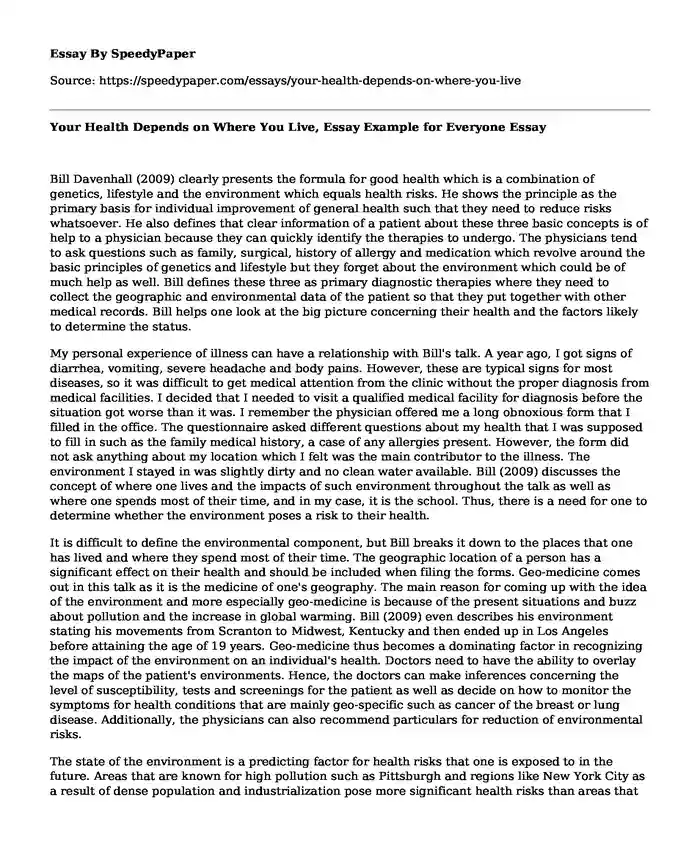
| Type of paper: | Essay |
| Categories: | Environment Community health |
| Pages: | 4 |
| Wordcount: | 848 words |
Bill Davenhall (2009) clearly presents the formula for good health which is a combination of genetics, lifestyle and the environment which equals health risks. He shows the principle as the primary basis for individual improvement of general health such that they need to reduce risks whatsoever. He also defines that clear information of a patient about these three basic concepts is of help to a physician because they can quickly identify the therapies to undergo. The physicians tend to ask questions such as family, surgical, history of allergy and medication which revolve around the basic principles of genetics and lifestyle but they forget about the environment which could be of much help as well. Bill defines these three as primary diagnostic therapies where they need to collect the geographic and environmental data of the patient so that they put together with other medical records. Bill helps one look at the big picture concerning their health and the factors likely to determine the status.
My personal experience of illness can have a relationship with Bill's talk. A year ago, I got signs of diarrhea, vomiting, severe headache and body pains. However, these are typical signs for most diseases, so it was difficult to get medical attention from the clinic without the proper diagnosis from medical facilities. I decided that I needed to visit a qualified medical facility for diagnosis before the situation got worse than it was. I remember the physician offered me a long obnoxious form that I filled in the office. The questionnaire asked different questions about my health that I was supposed to fill in such as the family medical history, a case of any allergies present. However, the form did not ask anything about my location which I felt was the main contributor to the illness. The environment I stayed in was slightly dirty and no clean water available. Bill (2009) discusses the concept of where one lives and the impacts of such environment throughout the talk as well as where one spends most of their time, and in my case, it is the school. Thus, there is a need for one to determine whether the environment poses a risk to their health.
It is difficult to define the environmental component, but Bill breaks it down to the places that one has lived and where they spend most of their time. The geographic location of a person has a significant effect on their health and should be included when filing the forms. Geo-medicine comes out in this talk as it is the medicine of one's geography. The main reason for coming up with the idea of the environment and more especially geo-medicine is because of the present situations and buzz about pollution and the increase in global warming. Bill (2009) even describes his environment stating his movements from Scranton to Midwest, Kentucky and then ended up in Los Angeles before attaining the age of 19 years. Geo-medicine thus becomes a dominating factor in recognizing the impact of the environment on an individual's health. Doctors need to have the ability to overlay the maps of the patient's environments. Hence, the doctors can make inferences concerning the level of susceptibility, tests and screenings for the patient as well as decide on how to monitor the symptoms for health conditions that are mainly geo-specific such as cancer of the breast or lung disease. Additionally, the physicians can also recommend particulars for reduction of environmental risks.
The state of the environment is a predicting factor for health risks that one is exposed to in the future. Areas that are known for high pollution such as Pittsburgh and regions like New York City as a result of dense population and industrialization pose more significant health risks than areas that have the scarce community and have little to no developments. An individual has to have a good understanding of the geo-health which is the relationship between them and the location, time and health. Pollutants released to the air cause significant problems such as immune diseases and cancer which is a deadly disease. Pollutants not only cause issues of health but also speed up the occurrence of the conditions that are already existing that one may not know about. Thus, the doctor's office should have a chance for one to describe the place they live to make the diagnosis easier. The doctors also need to be educated about issues of geo-medicine.
Davenhall (2009) makes a proposition for the inclusion of "place history" in the physician questionnaires and that this data needs to be incorporated in the electronic health records. The main reason for having the place history is to allow for easier analysis because one's health is affected by the place they live. It also helps the health professionals as well as researchers to understand trends in the broader environment, the risks involved and so work to mitigate the risks and ensure improvement in the health of the people.
Reference
Davenhall, B. (2009 October). The demise of guys? [Video File]. Retrieved October 2009 from https://www.ted.com/talks/bill_davenhall_your_health_depends_on_where_you_live
Cite this page
Your Health Depends on Where You Live, Essay Example for Everyone. (2022, Aug 26). Retrieved from https://speedypaper.com/essays/your-health-depends-on-where-you-live
Request Removal
If you are the original author of this essay and no longer wish to have it published on the SpeedyPaper website, please click below to request its removal:
- Victorian Poetry Analysis - Essay Example
- Essay Example on Advantages and Disadvantages of GAP-43
- Physics Essay Example Describing the Experiment Based on Newton's Second Law of Motion
- Essay Sample on End-of-life Conversations
- Law Essay Sample: Potential Causes of Action for Breach of Contract and Specific Performance
- Essay Sample on the Impact of Globalization on the Caribbean
- Essay Sample on Male Nurse Students in Maternity Ward
Popular categories




